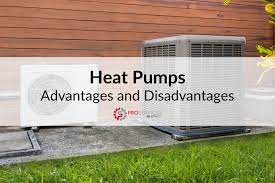If you’re looking for an efficient way to heat or cool your home, you’ve likely heard of heat pumps. Heat pumps are becoming increasingly popular due to their ability to provide heating and cooling, making them a versatile solution for homeowners. But like any heating or cooling system, heat pumps have advantages and disadvantages. In this comprehensive guide, we’ll explore the pros and cons of heat pumps, so you can decide if a heat pump is suitable for your home.
What is a Heat Pump?
Before diving into heat pump advantages and disadvantages, let’s define what a heat pump is. A heat pump is a device that transfers heat from one location to another. During the winter, a heat pump extracts heat from the outdoor air or ground and moves it indoors to heat your home. In the summer, the process is reversed, and a heat pump extracts heat from your indoor air and transfers it outdoors to cool your home.
Advantages of Heat Pumps
Energy Efficiency
One of the most significant advantages of heat pumps is their energy efficiency. Unlike traditional heating and cooling systems that generate heat or cool air, heat pumps transfer heat, which requires less energy. According to the U.S. Department of Energy, heat pumps can save homeowners 30% to 40% on their energy bills compared to traditional heating and cooling systems.
Versatility
As previously mentioned, heat pumps can provide heating and cooling, making them a versatile solution for homeowners. Heat pumps also offer dehumidification, improving indoor air quality and reducing the likelihood of mold growth.
Low Environmental Impact
Heat pumps use electricity to transfer heat, which produces fewer greenhouse gas emissions than traditional heating and cooling systems that burn fossil fuels. Using a heat pump can reduce your carbon footprint, and do your part to protect the environment.
Cost-Effective
While the initial cost of a heat pump may be higher than traditional heating and cooling systems, the long-term savings on energy bills make heat pumps a cost-effective solution. Additionally, many utility companies offer rebates and incentives for installing a heat pump.
Long Lifespan
Heat pumps have a longer lifespan than traditional heating and cooling systems. With proper maintenance, a heat pump can last up to 15 years, compared to 10 to 12 years for conventional systems.
Disadvantages of Heat Pumps
High Upfront Cost
As previously mentioned, the upfront cost of a heat pump can be higher than traditional heating and cooling systems. However, as previously mentioned, the long-term savings on energy bills make heat pumps a cost-effective solution.
Temperature Limitations
Heat pumps are most effective at providing heating and cooling in moderate climates. In extreme temperatures, a heat pump may not be able to provide adequate heating or cooling, and supplementary heating or cooling may be required.
Noise
Heat pumps can produce a humming sound while in operation.
